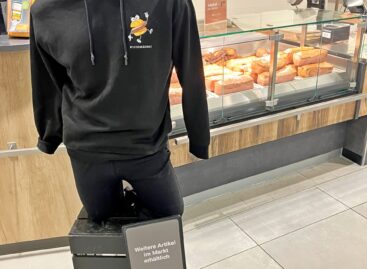Aldi Süd sends kebab food trucks on tour through Germany
Aldi capitalizes on rising restaurant prices and puts a spotlight on its private label fast food ranges. Food trucks selling Aldi kebabs are on a roadshow in several German cities.

The democratic food truck campaign ‘Döner for Everyone‘ is based on Aldi’s general marketing slogan ‘Something Good for Everyone’ | Photo: Aldi Süd
Aldi Süd food trucks are currently touring four German cities, offering kebabs made from the discounter’s own brands. Under the slogan ‘Kebab for Everyone’ the retailer is responding to calls for a ‘kebab price freeze’ that have gone viral on social media in Germany. The internet movement was triggered by an initial proposal by members of the German political party Die Linke to officially cap the price of a kebab in Germany at 4.9 euros.
An analysis by delivery company Lieferando.de (Just Eat Takeaway.com, Pyszne.pl) shows that the average kebab price in Germany’s 10 largest cities currently ranges from 4.96 euro to 6.03 euros. To emphasize the affordability of its own brands, Aldi offers a vegetarian kebab version for two euros and a kebab with chicken and beef for just three euros. Ingredients for both kebab types are certified at animal husbandry level 4 (formerly organic). Customers can buy the kebab in the car park of the Aldi stores participating in the roadshow.
Germany is the kebab capital of Europe. Next to pizza, kebab is the most popular fast food in the country. According to data provider Statista, one in three Germans (34%) eat kebab at least once a month. The Association of Turkish Döner Producers in Europe estimates the annual sales value of kebab in Europe at 3.5 billion euros, of which 2.4 billion euros are generated in Germany alone.
Retailers are increasingly tapping into the food service segment with their commercial offer. The restaurant sector in Germany is struggling with rising costs and staff shortages. The Federal Statistical Office of Germany reports that prices in fast food restaurants in July 2024 were more than 30% higher than at the beginning of 2020.
In addition, the VAT rate on meals consumed in cafes and restaurants in Germany was increased back to 19% from the beginning of this year, having been reduced to 7% in mid-2020 due to economic challenges in the wake of the Corona crisis. German credit reporting agency Crif expects insolvencies in the food service sector to rise by 30% by the end of this year after a 35% increase in 2023. The percentage is twice as high as the forecasted number across all sectors of the economy.
Related news
Aldi rolls out high-fibre logo across range
🎧 Hallgasd a cikket: Lejátszás Szünet Folytatás Leállítás Nyelv: Auto…
Read more >Related news
II. Green Gastronomy – Marketing Communication Workshop organized by the MMSZ HoReCa and Green Section
🎧 Hallgasd a cikket: Lejátszás Szünet Folytatás Leállítás Nyelv: Auto…
Read more >Nearly 140 domestic suppliers, 60% growth – SPAR Regions Treasures program accelerates with AI solutions
🎧 Hallgasd a cikket: Lejátszás Szünet Folytatás Leállítás Nyelv: Auto…
Read more >







